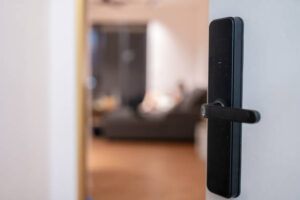How Key Control Systems Thwart Unauthorized Access
Ever had that gut-wrenching moment when you can’t find your keys? Now, imagine that on a larger scale in an office or apartment complex. The stakes are much higher, and the need for high security door locks becomes paramount. Enter key control systems—your silent sentinels against unauthorized access.
Key control systems are like having a super-organized friend who never loses anything. These systems keep track of every single key in real-time. Imagine being able to know exactly who has which key at any given moment! It’s not just about keeping things locked up; it’s about accountability and peace of mind.
Remember the last time you misplaced something important? Multiply that stress by ten if it’s a master key we’re talking about. With traditional methods, one lost key can spell disaster—a free pass for anyone with bad intentions. But with advanced key control solutions, losing a master key is less catastrophic because these systems can immediately disable it.
Think back to school days when teachers kept their eyes peeled during exams to prevent cheating. Similarly, modern workplaces need vigilant measures to safeguard sensitive areas from prying eyes and sticky fingers. A robust system doesn’t just hand out keys willy-nilly; it keeps tabs on them like an overprotective parent.
Let’s say you’re managing an apartment building with dozens of tenants coming and going daily. Traditional lock-and-key setups can quickly become unmanageable nightmares fraught with potential breaches and lapses in security protocols. On the other hand, automated tracking mechanisms ensure only authorized personnel have access at specific times—no more guessing games!

Consider Jane Doe working late nights alone in her office building’s archives section filled with confidential documents—she needs more than just good luck charms for protection! Implementing state-of-the-art technology ensures she feels safe knowing there aren’t rogue elements wandering around unchecked after hours.
You ever heard someone say they have “eyes at the back of their head”? That’s what sophisticated surveillance features integrated into these controls offer—they monitor movements without blinking! This continuous oversight deters would-be intruders while providing concrete evidence should anything go awry—a double whammy against foul play!
Picture this scenario: An employee leaves suddenly but forgets (or chooses) not returning company-issued keys—sounds familiar? Instead of changing all affected locks—which costs both time & money—the system simply deactivates those particular credentials remotely saving everyone involved quite some hassle!
Now, let’s talk about flexibility. Key control systems can adapt to various environments—from corporate offices to educational institutions and even healthcare facilities. Each place has its own set of security challenges, but these systems rise to the occasion like a chameleon changing colors.
Imagine being able to grant temporary access for maintenance workers or contractors without worrying about them having free rein forever. With key control, you can set time-limited permissions that expire automatically—no need for awkward follow-ups or chasing down keys.
And let’s not forget the beauty of data! These systems generate detailed logs showing who accessed what and when. It’s like having an all-seeing eye that keeps everyone honest without being intrusive.
Choosing the Right Key Control System for Multi-Tenant Buildings
High security door locks are essential in multi-tenant buildings. Imagine living in a place where anyone could waltz into your apartment. Sounds like a nightmare, right? That’s why choosing the right key control system is crucial.
First off, let’s talk about mechanical keys. They’re old school but reliable. However, managing them can be a pain—especially if you have dozens of tenants coming and going. Lost keys? You’ll need to rekey everything, which costs both time and money.
Now enter electronic key systems. These babies offer more flexibility and convenience than their mechanical counterparts. With just a swipe or tap of a card or fob, tenants can access their units without fussing over physical keys.
One huge perk is that electronic systems allow you to deactivate lost cards instantly—no locksmith required! But remember: they rely on electricity and internet connections. If either goes down, so does your access control.
Then there’s biometric systems—the James Bond of key controls! Fingerprints, retina scans… sounds futuristic because it is! This method offers top-notch security since it’s pretty hard to replicate someone’s eyeball pattern (unless you’re Ethan Hunt from Mission Impossible). Yet these high-tech wonders come with higher price tags and maintenance needs.
Ever heard of smart locks? They’re all the rage now thanks to smartphones ruling our lives. Tenants can unlock doors via apps or even voice commands through devices like Alexa or Google Home Assistant. Convenience at its peak!
But what happens when grandma visits without her smartphone savvy? That’s something worth pondering before making the switch entirely digital.
Let’s not forget about master key systems. They provide a balance between security and convenience for property managers. With one master key, you can access all units while tenants have individual keys for their own apartments. This system is especially handy during emergencies or maintenance checks.
However, the downside? If that master key falls into the wrong hands, it’s like giving away the golden ticket to your entire building. So guard it with your life—or at least treat it like you would your phone on a crowded subway.
Hybrid systems are also gaining traction. These combine mechanical locks with electronic features, offering a middle ground between traditional and modern methods. Think of them as the Swiss Army knife of key control—versatile and reliable.
Let’s talk costs because no one likes sticker shock. Mechanical keys are generally cheaper upfront but could rack up expenses over time due to rekeying needs. Electronic and biometric systems might feel like an investment initially but often save money in long-term management efficiency.
Consider user-friendliness too! Tenants range from tech-savvy millennials to those who still struggle setting up voicemail (no judgment here). The best system is one everyone can use without needing a PhD in engineering.
Security isn’t just about keeping bad guys out; it’s also about peace of mind for everyone living there. Imagine Mrs. Thompson from 3B finally sleeping soundly knowing her door lock isn’t something Houdini could pick blindfolded!
Lastly, always stay updated on technology trends and advancements in security solutions—it evolves faster than you’d think! What works today might be outdated tomorrow.






